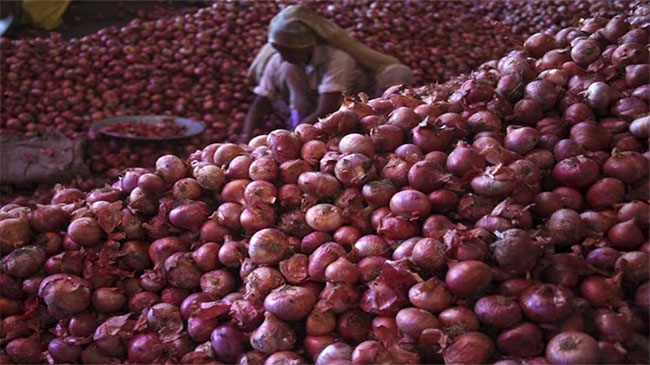India imposes 40% export duty on onions to calm rising prices
August 20, 2023 08:08 am
(Reuters) - India will impose with immediate effect a 40% export duty on onions up to Dec. 31 in an attempt to improve domestic availability of the vegetable, the ministry of finance said in a notification on Saturday.
The duty imposed by the world’s biggest exporter of onions will help New Delhi dampen local prices ahead of key state elections later this year but will force Asian buyers to shell out more, as other regional exporters have limited supplies.
“The export duty will make Indian onions more expensive than those from Pakistan, China, and Egypt. This will naturally lead to lower exports and aid in reducing local prices,” said Ajit Shah, an exporter based in Mumbai.
Average wholesale onion price in key markets has jumped nearly 20% from July to August, to 2,400 rupees ($28.87) per 100 kg on concerns that erratic rainfall would lead to lower yields.
India is heading for its driest August in more than a century, with scant rainfall likely to persist across large areas, partly because of the El Niño weather pattern, two weather department officials told Reuters on Friday.
“Onions harvested during the summer months are rotting quickly, and the new supplies are being delayed. This situation has prompted the government to take precautionary measures,” said another Mumbai-based exporter.
India’s onion exports in the first half of 2023 jumped 63% from a year ago to 1.46 million metric tons.
Countries such as Bangladesh, Nepal, Malaysia, United Arab Emirates and Sri Lanka rely on Indian shipments.
Onions are used as the base for traditional dishes across Asia such as biryani in Pakistan and India, belacan in Malaysia and fish curry in Bangladesh.
“The Indian duty would prompt China and Pakistan to raise prices, as they have a limited surplus for exports,” said the second exporter.
India’s annual retail inflation (INCPIY=ECI) in July rose to its highest in 15 months as vegetable and cereals prices skyrocketed, putting pressure on the government to take action to bring down prices.
India surprised buyers last month by imposing a ban on widely consumed non-basmati white rice sales to dampen price rises.
Source: Reuters
--Agencies












